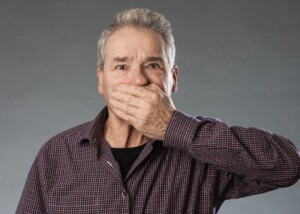Do you get hiccups while eating and they seem to be coming from your hiatal hernia?
Here is how to prevent the hiccups while you eat your favorite foods.
If your hiccups occur only when you’re eating, then there must be something about your eating that’s causing this annoying situation.
Furthermore, if you’ve been diagnosed with a hiatal hernia, this condition wouldn’t necessarily be causing the hiccups.
A hiccup is when the diaphragm (the muscle that divides your chest and abdominal cavity) contracts or spasms.
“If hiccups are occurring predominantly during eating (regardless of whether or not hiatus hernia is present), one contributing factor may be aerophagia (medical terminology for excessive air swallowing),” explains Santosh Sanagapalli, MD, a consultant gastroenterologist, endoscopist and specialist in esophageal disorders.
What about the hiatal hernia itself as the cause?
“Hiatus hernia has been linked to hiccups — there seems to be an increased incidence of hiatus hernia in persons with persistent hiccups,” says Dr. Sanagapalli.
“However, most people with hiatus hernia do not suffer with hiccups, and further, many people with persistent hiccups do not have a hiatus hernia.
“Whether hiatus hernia truly causes hiccups has not been established, and the mechanism by which it would do so is not known.
“It may be simply due to the fact that hiatus hernia predisposes to acid reflux, which may trigger hiccups in certain individuals due to vagal nerve effects.
“There is no particular reason why hiatus hernia would cause hiccups only while eating.”
How to Prevent Hiccups from Eating
“Strategies which may help include: sitting down to the meal and eating more slowly, not talking during the meal, avoiding fizzy drinks and avoiding chewing gum.”
If you still suddenly hiccup, hold your breath for 10 seconds and see what happens. This may prevent a second hiccup.
“If such simple measures are not working, the next step in treatment is usually a trial of anti-reflux medication (PPI and/or antacid),” says Dr. Sanagapalli.
“Alternative therapies such as hypnosis and acupuncture can be tried.
“If none of this is helpful, other medications can be tried to treat the hiccups (e.g., baclofen, gabapentin, chlorpromazine).
“Seek individualized medical advice to determine whether these are appropriate.”
Dr. Sanagapalli explains the types, risk factors, symptoms and treatments for a hiatal hernia here.
 Dr. Sanagapalli is a gastroenterologist and director of the Esophageal Disorders Center at St Vincent’s Hospital, Darlinghurst. He performs diagnostic and therapeutic endoscopic procedures, and enjoys providing comprehensive and holistic care to patients with a wide variety of disorders affecting the gastrointestinal tract.
Dr. Sanagapalli is a gastroenterologist and director of the Esophageal Disorders Center at St Vincent’s Hospital, Darlinghurst. He performs diagnostic and therapeutic endoscopic procedures, and enjoys providing comprehensive and holistic care to patients with a wide variety of disorders affecting the gastrointestinal tract.
 Lorra Garrick has been covering medical, fitness and cybersecurity topics for many years, having written thousands of articles for print magazines and websites, including as a ghostwriter. She’s also a former ACE-certified personal trainer.
Lorra Garrick has been covering medical, fitness and cybersecurity topics for many years, having written thousands of articles for print magazines and websites, including as a ghostwriter. She’s also a former ACE-certified personal trainer.
.



























